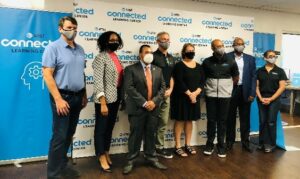As a mother of a seven and three-year-old at the beginning of a global pandemic, virtual school meant scrambling to balance work and childcare. Like many Americans–I had to play teacher from the living room couch to ensure my preschooler was advancing, while also working a full-time job consisting of a marathon of Zoom calls. At first, I was eager and optimistic, then the “new normal” of virtual school cascaded into the rest of the following academic year and my primary concern was how to successfully balance all of the hats I was wearing while keeping my family safe.
At Dell Technologies, the power of technology and the issues of inaccessibly has always been a concern. Although it was exacerbated by the pandemic, it was something we thought about every single day. We have always believed that technology has the power to transform and, thankfully in the community I live in, we were able to do just that–moving classrooms online and working from the comfort of our own homes. However, not everyone was as fortunate. The stark divide between those with access and those without was deepened.
It should not have taken a catastrophic, worldwide tragedy to bring urgency to addressing this divide. For Dell Technologies, access to technology has been a focus for more than a decade. What has become increasingly apparent is that for communities to take advantage of all the opportunities in the digital economy, they also need to have access to broadband services, as well as basic digital literacy skills and resources. That’s why we’re working with public and private sectors to contribute to local ecosystems and partnerships that extend support beyond the device by also providing access and knowledge to all communities. It’s the collaboration we need to become a digitally inclusive society for all.
One such community ecosystem is a collaboration with AT&T announced in September to support Connected Learning Centers. Starting with a long-time AT&T community partner, Family Gateway, Dell Technologies and others will contribute devices that bring connectivity, skills and devices to more than 20 underserved communities across the nation.

Here’s a small sampling of other community-led efforts:
- For years, Dell Technologies has worked with schools to implement Dell Student TechCrew — a student-led IT help desk on high school campuses that promotes digital skills and future career opportunities. Since last October, the program has doubled, with 93 TechCrews supporting around 700,000 students. We also successfully launched in Australia and plan to introduce the program to additional countries in 2022. In addition, this upcoming year, we will partner with Boys and Girls Clubs of America to offer Dell Student TechCrew to the young people they serve, supporting their mission to enable all young people to reach their full potential.
- This summer, Dell Technologies worked with Intel to launch an expansion of its AI for Workforce Program for students in 18 community colleges across the nation. Dell Technologies provided technical and infrastructure expertise to help educate the next generation of technologists, engineers and investors.
- Last month, in partnership with The Home Depot, we developed an Innovation Lounge at Clark Atlanta University, to pursue entrepreneurial, academic and career opportunities for students to collaborate, complete projects, access job opportunities, take part in technology curriculum and relax between classes.
- We collaborated with UK government, industry and civil society leaders to form the Inclusive Economy Partnership (IEP) Digital Inclusion Impact Group. The group supports initiatives that improve digital skills and facilitate better access to digital technologies. One of the first projects to be supported by the Digital Inclusion Impact Group is Dell Donate to Educate. The joint initiative between Dell Technologies and Microsoft helps businesses support children and their families with access to the right technology at school and home.
- We are also evolving our Dell Solar Learning Labs to become Dell Community Hubs, to have an even greater impact on underserved communities around the world. These solar power classrooms provide digital access to education for children in remote areas.
It’s clear that technology and education will drive human progress and transform change. To empower everyone to be able to take part in the emerging global digital ecosystem, universal accessibility will drive recovery and create flourishing communities. It’s core to who we are as a company and how we work with customers and communities to drive progress. It’s why we laid out our 2030 Progress Made Real Social Impact Agenda, which heavily focuses on education, to deliver enduring results for one billion people by 2030.
We are committed to access for all. Visit our website, Dell Technologies is helping to create digital inclusive communities.
